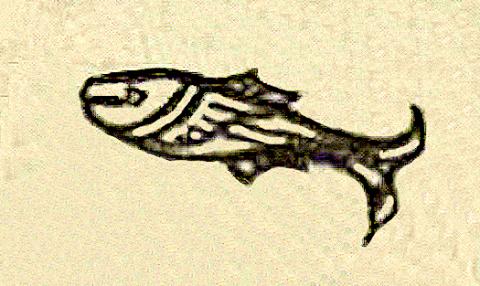michin (T2681:6:2r)
This element of a fish (michin) is taken from the compound place glyph for Michcalcoa. It is rendered in black and white and facing left in profile. The fish has a bifurcated tail and two fins, one above and one below. The body also has horizontal stripes, and there are two curving lines where the gills are located.
Robert Haskett
This atomic element appears on a pictorial manuscript submitted by Indigenous petitioners from the pueblo of Cuitlahuacan, Chalco, sometime before March 24, 1579, when a canoe-born investigation was carried out of a chinampa (a raised field in the shallow waters of a laguna) near the sujeto (dependency) of Santa María Magdalena Michcalco (also called an estançia). The community’s land tenure was being threatened by an effort of a man named Bartolomé Arias to gain a grant of this property from the viceregal authorities (an effort that ultimately failed). While Arias and several witnesses who supported him claimed that the parcel was filled with grass, used by him to pasture horses, witnesses for Santa María Magdalena and Cuitlahuacan asserted that it was customarily planted with maize, chili, and other agricultural crops. On the pictorial itself, Michcalco is situated among bar-shaped figures that represent chinamitl (also called chinampas) agricultural plots and an alphabetic gloss that says “Michcalco Santa Maria Magdalena” (see Historical Context Image). While there is a short Nahuatl-language petition included among the folios of this case (14r), it does not mention specific crops, and it uses the loan solar (lot) rather than chinamitl or chinampa to describe it. On the other hand, a Spanish-language report of a second canoe-borne investigation (fol. 18r) states that the parcel in question is “que los indios llaman chinampas” (“what the Indians call chinampas”) and includes a brief description of how such things are built.
Robert Haskett
michcalco
Michcalco
Robert Haskett
1579
Robert Haskett
fish, pez, pescado, peces

mich(in), fish, https://nahuatl.wired-humanities.org/content/michin
el pez
Robert Haskett
Single-page codex, Archivo General de la Nación, México, Ramo de Tierras Vol. 2681, Exp. 6, Fol. 2r.
The Archivo General de la Nación (AGN), México, holds the original manuscript. This image is published here under a Creative Commons license, asking that you cite the AGN and this Visual Lexicon of Aztec Hieroglyphs.




